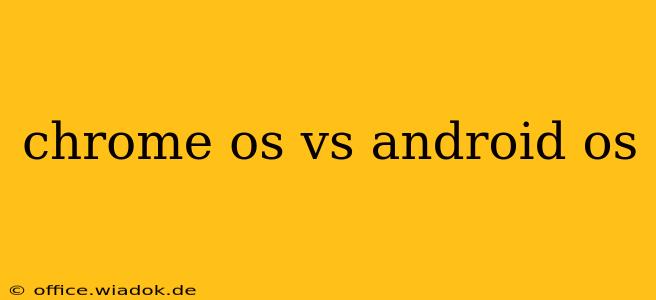Choosing between Chrome OS and Android OS often boils down to individual needs and preferences. Both are powerful operating systems, but they cater to different users and use cases. This in-depth comparison will delve into the key differences, highlighting the strengths and weaknesses of each to help you decide which OS best suits your lifestyle.
Core Differences: A Quick Glance
Before diving into the specifics, let's outline the fundamental differences between Chrome OS and Android OS:
-
Chrome OS: Designed primarily for web browsing and cloud-based applications. It's lightweight, fast, and secure, ideal for users who spend most of their time online. Think of it as a streamlined, browser-centric experience.
-
Android OS: A mobile operating system renowned for its versatility and app ecosystem. It offers a wider range of applications, from productivity tools to games and specialized utilities, catering to a diverse user base. It's more adaptable to various hardware configurations.
Performance and Speed: A Head-to-Head
Chrome OS: Known for its speed and efficiency. Its lightweight nature allows it to run smoothly even on lower-spec hardware. Boot times are incredibly fast, and multitasking, while limited by its app ecosystem, is generally fluid. This makes Chrome OS an excellent choice for budget-friendly Chromebooks.
Android OS: Performance varies greatly depending on the device's hardware. High-end Android phones and tablets offer seamless multitasking and impressive speeds, rivaling, and sometimes exceeding, Chrome OS. However, lower-end devices can struggle with performance, especially with demanding applications.
Winner: While high-end Android devices can match or surpass Chrome OS in performance, Chrome OS's consistent speed and efficiency across various hardware levels give it a slight edge in this category for budget-conscious users.
App Ecosystem: A Tale of Two Stores
Chrome OS: Relies heavily on web applications and the Chrome Web Store. While the store offers a growing selection of apps, it still lags behind Android in terms of variety and native applications. However, progressive web apps (PWAs) are bridging this gap, offering a near-native experience for many applications.
Android OS: Boasts the massive Google Play Store, home to millions of apps covering almost every conceivable category. This vast selection is arguably Android's greatest strength, allowing for unparalleled customization and functionality.
Winner: Android clearly wins this round. The sheer volume and variety of apps in the Google Play Store are unmatched by Chrome OS.
Security and Privacy: A Fortress vs. Openness
Chrome OS: Prioritizes security, regularly receiving automatic updates and employing strong security measures. Its sandboxed environment helps prevent malware from spreading, making it a very secure operating system.
Android OS: While Android has improved its security significantly over the years, it remains more susceptible to vulnerabilities compared to Chrome OS. This is partly due to its open-source nature and the vast number of devices running different versions of the OS.
Winner: Chrome OS takes the lead in security due to its simpler architecture and focused updates.
Flexibility and Customization: Tailoring Your Experience
Chrome OS: Offers limited customization options compared to Android. While you can personalize themes and extensions, the overall experience is less flexible.
Android OS: Allows for extensive customization, with options to change launchers, widgets, and icons. Users can tailor their Android experience to their preferences, enhancing both functionality and aesthetics.
Winner: Android provides significantly greater flexibility and customization choices.
Conclusion: Choosing Your Champion
The choice between Chrome OS and Android OS depends heavily on your priorities. If you value speed, security, and simplicity, Chrome OS is an excellent choice, particularly on a Chromebook. However, if you require a vast app ecosystem, extensive customization, and a wider range of hardware options, Android remains the superior option. Ultimately, the "best" OS is subjective and determined by individual needs.

